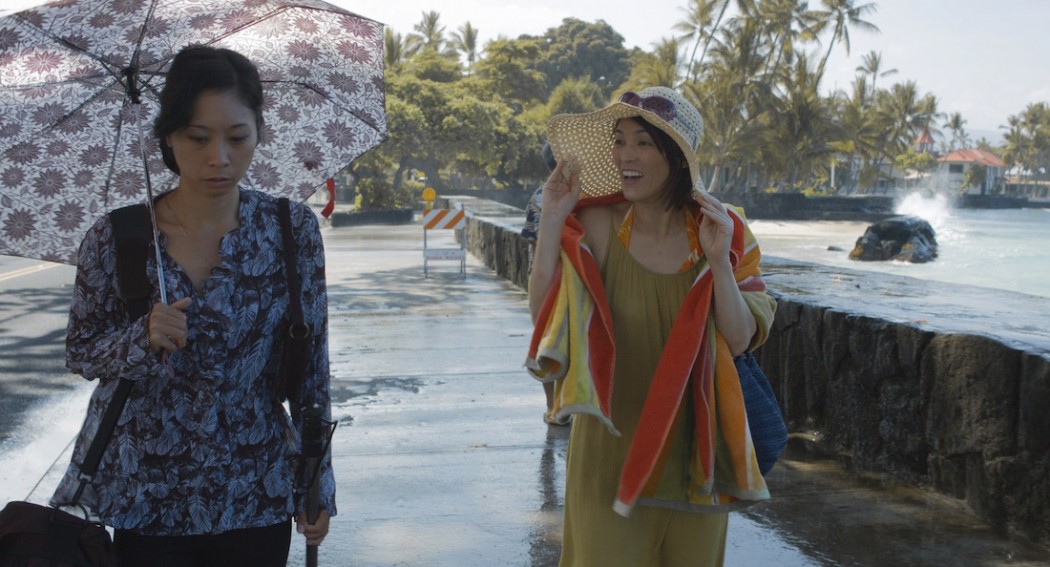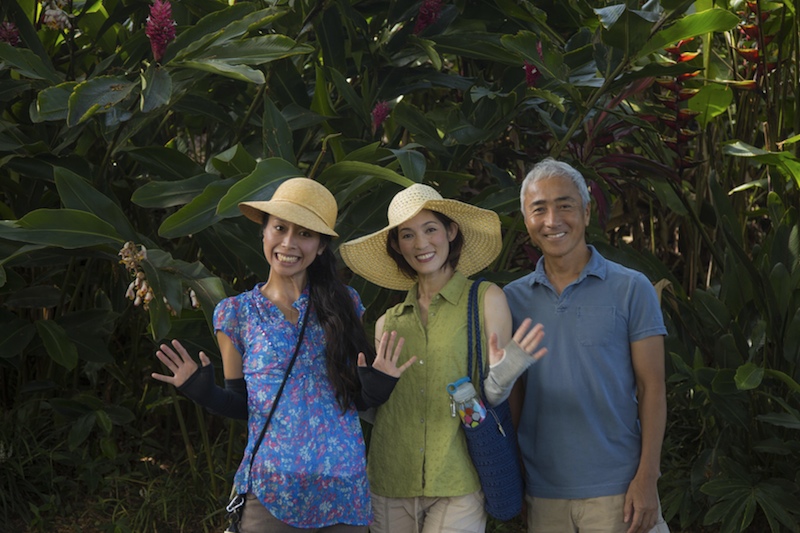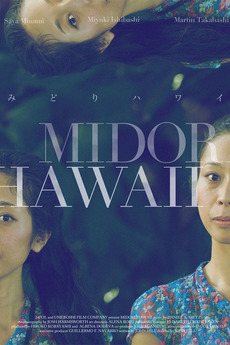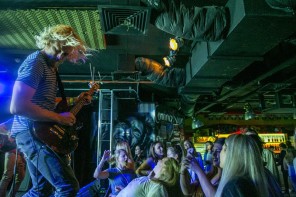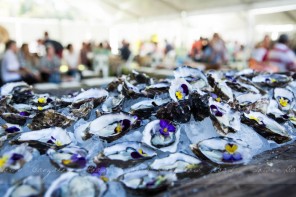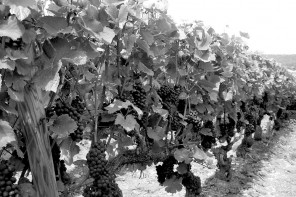Saya Minami stars in the popular drama Midori in Hawaii at the Byron Bay Film Festival, on Sunday October 16, writes Digby Hildreth. Verandah Magazine has a double pass to giveaway to this enchanting study of family life – simply leave a msg below or on our Facebook page to be in the running.
Saya Minami’s motives for becoming an actress were a little different than most. It wasn’t for the fame, and certainly not for the money. (This quietly spoken Japanese woman, now resident in Mullumbimby, despises materialism.) Nor was it even so she could channel her inner Ophelia. It was, she says, to help publicise the real story about the Fukushima nuclear power plant explosion in 2011 – to tell the truth about its hideous and ongoing consequences to the people of Japan, whose government is lying to them, she says, pretending that everything is OK.
She is now in a position to do that, having achieved some international profile in a feature drama called Midori in Hawaii. The film is screening at the Byron Bay Film Festival, which opens next Friday (October 14). It’s an enchanting study of family, life and the changes that occur as we grow apart from our loved ones. The story follows two sisters as they re-unite over five days when Midori (Minami) is visited by older sibling Seiko (Miyuki Ishibashi) and her husband Kyo-Chan ) Martin Takahashi) on the Big Island of Hawaii, where she’s been living for years.
Midori has carved out a life for herself, with work as a wedding photographer; she is self-sufficient but isolated and with the arrival of her sister she has to confront a past left behind. Minami’s heartfelt, down-to-earth performance is matched by a subtly ironic undertone; and the superb writing and sound design create an understated, realistic atmosphere that draws the viewer in.
The film comes to Byron hot from the international festival circuit, where it was nominated for best film at the Hawaii International and accepted into the Anchorage International.
The opportunity to have the lead role in such a big film was born in the aftermath of a shocking epiphany for the actress. While riding her bike in Tokyo, Saya was hit by a car. The accident broke her pelvis and left her in a hospital bed for more than two months – a great opportunity to re-examine her life, which was that of a salary-slave in the internet industry in Tokyo, working huge hours.
Coming out of a coma after the accident, her first thought was a panicky, “Oh my God, I have to go to work,” she recalls. It struck her as a terrible way to live, with work such an overwhelming concern. “I didn’t like my life and I thought ‘I want to live in another country’,” she says.
She had visited Cairns as a teenager with her aunt and great auntie, a well-known actress in Japan, and had fond memories of it, “so I thought I could come to Australia”. A friend recommended Byron Bay (“for its really great music”), so she came here with the intention of travelling around the country. But arriving here, she felt “like Alice in Wonderland”, and she stayed. That was seven years ago.
She had some experience of screen work in Japan – a part-time job in a television show when she was 18, which she hated: “The TV industry there was obsessed with looks and expensive brands,” she says, and it gave her a skewed idea of the acing profession. The Northern Rivers seemed to her “like paradise…I forgot about everything; no stress, just enjoying Byron Bay”.
“But after two years, there was the accident at Fukushima, and the tsunami that followed. I saw it on the news and it was shocking, terrible.” She knew nothing about nuclear power plants or the issues around nuclear power and the ever-changing news reports just made her confused. The full gravity of the situation only struck her when walking around Byron she was approached by many concerned people asking after her family back home.
Then she met anti-nuke campaigner Helen Caldicott and her eyes were opened. “I was shocked and I felt I really needed to tell the Japanese people.”
Efforts to inform her friends in Japan were shut down: “They didn’t want to hear any more about radiation,” she says. “They are so scared to face the reality. And then there’s the media and the government saying ‘it’s OK, no problem, nothing wrong’.” But she was really worried about her family, especially her younger sister, whom she feels is a part of her.
“Even though I’m in paradise, if she is at risk I’m worried and sad,” she says. Sad too for all the many children in Fukushima, many of them ill and without any support from the government – all part of the official denial.
“The government is saying ‘let’s eat Fukushima products to support the people there’,” she says. “They are even burning nuclear waste in Japan now, she says. “If you talk about radiation in Japan you are considered a bad person.”
Saya started fundraising with an activist friend to set up Bridge to Fukushima, which aimed to bring children to Byron Bay “to have a good time and rest their bodies and souls” – and to give them a taste of another reality, away from Japan’s hyper-controlled environment.
Expensive airfares and immigration problems made it all too difficult and she was left “thinking and researching” about Fukushima, feeling increasingly depressed and powerless, she says, and running the risk of becoming “mentally sick”.
Then the acting bulb lit up, as a way to tell this story, to move people to listen, she thought.
So she contacted Byron Bay Film and TV school, run by Mark Piper, did a one-day workshops and fell in love with acting.
She remembers thinking “’I’m a natural! This is what I want to do for my whole life.’ I really loved it,” she says. “I was in a very sad place but acting is like being in another world, where I don’t need to worry about anything. I can just be another person. This is the answer, my answer, because I can be happy doing the acting, can feel joy and at the same time maybe if I want to touch somebody’s heart, I can do it and make them change their opinion. It all seemed suddenly connected.”
Her goal is to stop nuclear expansion across the board: power plants, arms, uranium mining, and she believes she is best doing it in Australia.
“I really need to do this here because Australia is mining uranium and now South Australia is building a facility to store nuclear rubbish – on Aboriginal land,” she says. “I need to tell the story of Fukushima, and also Hiroshima and Nagasaki, because many of the survivors are dying and Japanese people need to talk about this issue, because they just don’t know what’s going on. I want to be an actress, a really good actress to tell this story.”
Following the Byron training and other workshops, Saya applied for roles in short and student films and signed up to a US casting website, which is where the makers of Midori in Hawaii found her and gave her the role.
Shooting lasted about a month on the Big Island of Hawaii and it was an amazing experience, she says, with a great crew who just love filmmaking in such a beautiful location. But while filming she learned that her father, who had been ill for many years with kidney and heart disease, had had a stroke. He had always been very supportive of Saya’s acting, but the stroke left him with memory loss – a detail that is echoed in the film, which became a highly-charged emotional experience for her. Her dad has recovered his memory but hasn’t seen Saya’s film, although she tried to get it onto the big screen for him at the Tokyo Film Festival.
Back in Australia, her purpose is being realised. This weekend she is busy acting in and co-producing a short drama about a boy from Fukushima who has thyroid cancer, filming at the Rainbow Temple in Rosebank and a cottage in Broken Head.
Twins Gemma and Jade Hassett of the Gold Coast’s Powerhouse Media Productions are the team behind it, having been alerted to the true horrors of Fukushima by Saya’s online postings. The film is called Good Fortune Island, a title with a dreadful irony to it. The name is the English translation of Fukushima – a placename, like the landscape, that is now forever poisoned.
Midori in Hawaii is screening at the Byron Community Centre on Sunday, October 16 at 11.15am as part of the Byron Bay Film Festival.
To buy tickets or a Flexi-Pass, you can download the Ferve app on your iPhone or Android. You can also buy online at www.bbff.com.auor in person at the Byron Community Centre.
Verandah Magazine has a double pass to giveaway to this enchanting study of family life – simply leave a msg below or on our Facebook page to be in the running.

